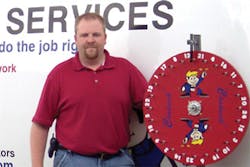Every time Tad Chadwick sends one of his techs out on a service call, he's reminded of why he doesn't want to lose them. It takes a lot of time and training to prepare them for customer interaction, so the last thing he wants is to lose a tech and have to start all over. When it comes to handling housewives — desperate and otherwise — electrical know-how is only part of the equation. “You can't just take an electrician off the street, put them in a truck, and be good to go,” he says. “Electrical is only 30% of it; the other 70% is putting the customer at ease, educating them, and putting forth that extra effort necessary for service work.”
Since becoming the president of Chadwick Electric Services when it opened last year, he's employed a man-of-the-people management style that his parents established when they opened Chadwick Electric as a residential construction company in the early '70s. His employees respect him and stick with him, he says, because he lets them know where they stand, takes an interest in their lives, and most importantly, empowers them. Sometimes, though, it's the things he doesn't do that make the difference. “Everyone's had four or five bosses who did things that made the job unbearable,” Chadwick says. “You just have to think of those experiences you've had and try not to make the same mistakes.”
Human resources 101. The air is always thick with feedback in the Chadwick Electric Services office. When a technician closes a sale of $1,500 or more, the rest of the staff gets a page with the good news. And Chadwick sets aside time in monthly meetings to reward techs who exceed their sales goals with a bonus check and public recognition. The pages and the bonuses are small gestures, but they add up to create an immeasurable sense of appreciation that helps with retention. “We want them to know we wouldn't be as successful without them,” Chadwick says.
Of course, not all feedback has to be positive — as long as it's constructive. The only way to correct mistakes is to address them when they happen, and the right approach will go a long way toward effecting change. Chadwick knows his employees don't want to hear that they've screwed up, but at least they know where they stand with him. “Don't bottle it up and give them dirty looks,” he says. “Let them know they really messed up, but then work with them to figure out how they can fix it.”
Techs have told Chadwick they'll never work for another electrical contractor because it just wouldn't be the same, and he says that's due in large part to the company's family-like environment. Keeping in mind the dangers of getting too friendly with his employees, he's instituted two regular activities to strengthen that atmosphere: a weekly golf outing for the entire staff and monthly one-on-one lunches with each tech. Talking about work isn't forbidden, but he prefers to just shoot the bull. “That way they know you care about what's going on in their personal lives,” he says, “instead of not knowing that their sales are down because they broke up with their girlfriend two weeks ago.”
And even when they're at the office, the atmosphere is light in the right circumstances. Chadwick made his Wheel of Destiny — a 3-foot wheel that employees spin for prizes — a part of monthly meetings to prevent those get-togethers from devolving into complaint sessions.
The biggest reason the service company has only had 20% turnover since opening shop, though, may be the freedom and sense of empowerment his techs enjoy. They have the authority to price every job in the field, and as long as they're hitting their profit margins, he doesn't question their decisions. It's a theory he learned while working at a big box hardware store: it's better to ask forgiveness than ask permission.
That empowerment extends to offering opinions on how to run the business, too. Chadwick admits he's not an idea man, so he put out a suggestion box to encourage input. “Listening to people's opinions — even if you don't use their ideas — let's them know you value them,” he says.
Part of showing employees appreciation is giving them a healthy paycheck, and in that respect, technicians at Chadwick Electric Services have plenty of reason to feel appreciated. But that's not why they stick around. Their boss shows them a different kind of appreciation you can't put a price on, and they repay him everyday. “I call each of my guys at the end of every day to make sure everything went okay,” Chadwick says. “And that means something to them. We take care of them, and they take care of us.”
Sidebar: Troubleshoot Turnover
Losing one tech can be difficult, but losing several can be crippling. If employees keep walking out, you have to do something. Offering raises won't help; an extra $.50 an hour won't change the fact that someone doesn't like working for you, but you do have other options.
-
Just ask — Exit interviews can turn into gripe sessions, but they'll also uncover a few useful tidbits. Offer to write a letter of recommendation first to put the employee at ease, and then ask for the straight story. “You've got to find out why they left before you can change anything,” Chadwick says.
-
Find an insider — Every staff has someone who likes to talk. Find them, but don't push too hard for info. Even an occasional enquiry about why the troops aren't happy can reveal a lot.
